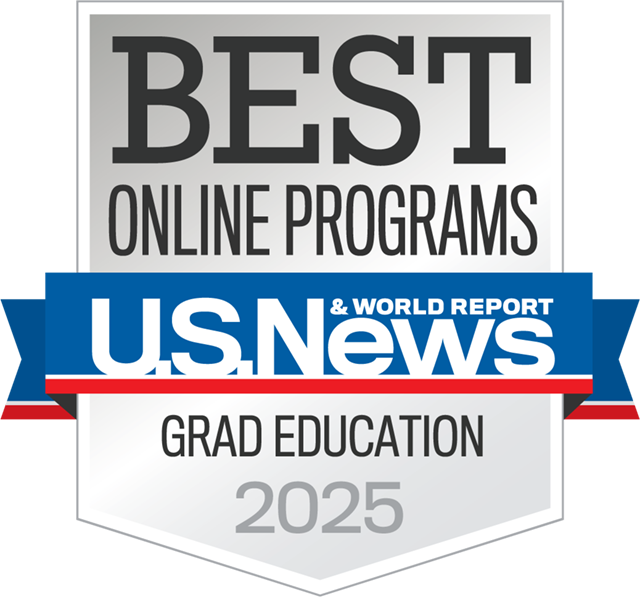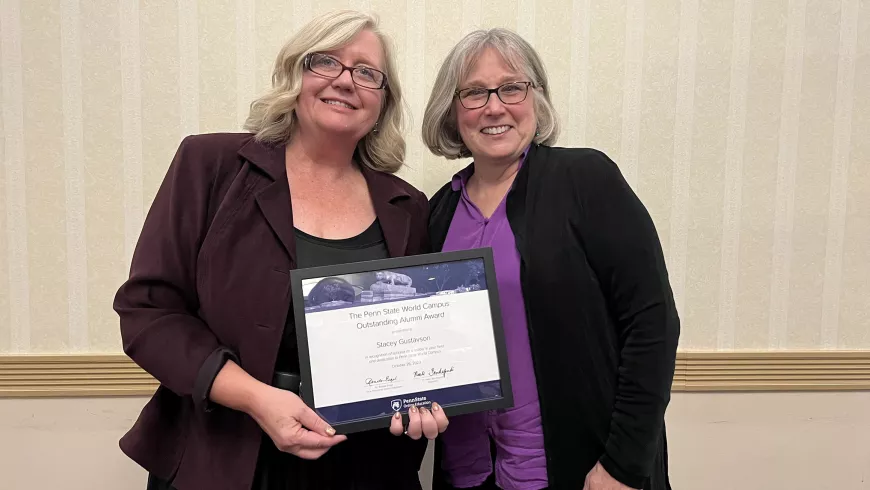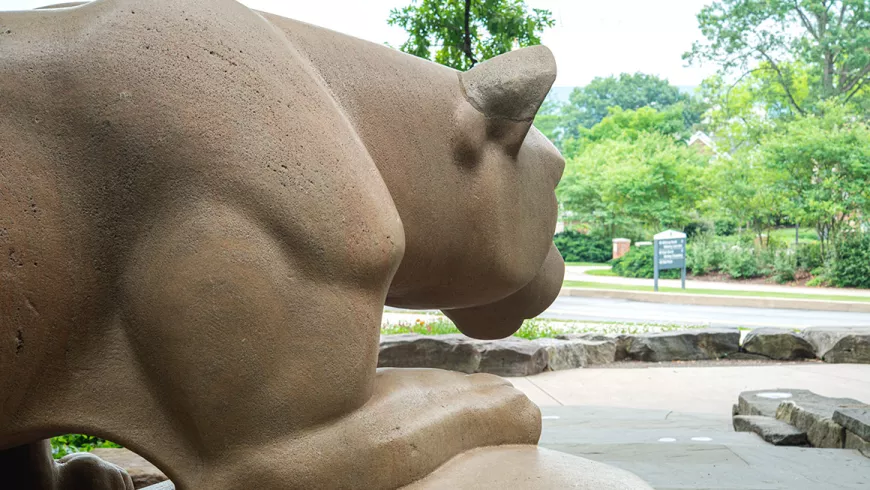100% Online
Complete your Penn State course work at your own pace and 100% online.
Application deadline
Credits and costs
Nationally Recognized

Enhance Your Career in Higher Education with These Skills
Collect and analyze data to improve practice in administrative areas of higher education.
Draw upon key theories, concepts, and research findings to assess current issues and challenges facing higher education institutions.
Understand the purpose, audience, and context in communication with faculty, administration, and students.
Gain a broad introduction to various aspects of higher education, such as careers, policies, administration, history, organization, and evaluation of postsecondary education programs and activities.
Customize Your Course List
Customize Your Course List
The master's in higher education offers emphasis areas in administration, student engagement, and institutional research.
Course work in the study of higher education institutions includes:
- current challenges facing higher education
- evaluation of student affairs
- career roles within colleges and universities
- administrative leadership
- institutional research
- enrollment management
If you are a student interested in earning both the certificate in institutional research and the M.Ed. in Higher Education from Penn State, you will need a minimum of 36 credits to earn both the 30-credit M.Ed. and the 15-credit certificate.
Required Courses (15 credits)
- 3credits
Foundations in the policy context and student characteristics of postsecondary education; analysis of issues and future trends in the field.
- 3credits
Explores concepts, methodologies and research practices that support campus decision-making: national data sets, planning and budgeting, enrollment management and enrollment forecasting, faculty studies and instructional analysis, institutional effectiveness and accreditation, educational effectiveness and student outcomes assessment.
- 3credits
This course is an overview of graduate study, professional careers, and professionalism in higher education.
- 3credits
This course gives students an overview of administrative leadership within higher education institutions. Students learn about organizational structure, governance, leadership, decision-making, internal and external constituencies, culture, resources, and organizational change. Brief discussions of key organizational theories are included but the course primarily focuses on administrative practice.
- 3credits
Numerous scholars, over many years, have explored a wide array of topics about college students — their preparation for college, their generalized and particularized characteristics, their behaviors in college, their attitudes about social issues, their relative success in achieving learning outcomes, their engagement (or lack thereof) with various components of the collegiate learning experience, their persistence, and the list goes on and on.
Culminating Experience (3 credits)
- 3credits
Creative projects, including nonthesis research, that are supervised on an individual basis and fall outside the scope of formal courses.
Emphasis Area (6 credits)
Administration (6 credits)
- 3credits
Strategic planning and resource management in higher education through institutional research.
- 3credits
This course is an overview of the legal standards arising in higher education, including institutional legal obligations, the rights and responsibilities of faculty, staff, and students, and the legal and regulatory roles of states and the federal government.
Student Engagement (select 6 credits)
- 3credits
Principles involved in teaching at the college level; effective use of teaching aids; criteria used in evaluation.
- 3credits
An overview of the academic advising profession and the role of academic advising in the collegiate setting
- 3credits
Academic program assessment/student outcomes in accountability and accreditation processes.
- 3credits
This course examines the nature and purpose of the student affairs profession, its functions, and how they can be effectively managed, coordinated, and integrated as part of student learning in American institutions. It also explores institutional strategies for organizing, staffing, and funding the large portfolio of programs, services, and facilities designed to facilitate student learning and development at different types of institutions.
Institutional Research (select 6 credits)
- 3credits
Strategic planning and resource management in higher education through institutional research.
- 3credits
Teaches best practices and necessary skills in quantitative and qualitative research design, including sampling and basic measurement issues, research methods, survey research, interviews, focus groups, and selecting appropriate statistical tools.
- 3credits
Academic program assessment/student outcomes in accountability and accreditation processes.
- 3credits
Topics include measuring faculty workload, evaluating faculty research productivity, the uses and misuses of student ratings, assessment for promotion and tenure, and methodologies for conducting salary studies.
- 3credits
Studies three stages of enrollment management: Pre-admission, initial student experience, and student success and completion.
Electives (select 6 credits)
Choose from a list of elective courses in higher education with approval of a faculty adviser to satisfy 1–9 credits of this requirement.
Note that students have the option of taking elective courses in an area of professional practice or designing their own program of study from electives offered in higher education or other relevant areas in the College of Education.
- 3credits
Supervised experience in administrative offices, in research, on instructional teams, and in college teaching. (Recommended for students without work experience in higher education.)
Course Availability
If you're ready to see when your courses will be offered, visit our public LionPATH course search (opens in new window) to start planning ahead.
Start or Advance Your Higher Education Career

Start or Advance Your Higher Education Career
A higher education master's is useful for entry-level professionals in a variety of administrative areas and those aspiring to become mid-level administrators of college and university offices, as well as practitioners in a variety of administrative functions desiring further professional development and career enhancement.
Job Titles Related to This Degree
If you are interested in teaching at a university, a doctorate in the subject you wish to teach is typically required. A master’s degree may qualify you to teach at a community college, but should also be in the subject that you wish to teach.
The following roles are often held by people with this type of degree:
- Academic Affairs Director
- Admissions Director
- Financial Aid Director
- Institutional Research Director
Employment Outlook for Occupational Fields Related to This Degree
Estimates of employment growth and total employment are provided by the U.S. Bureau of Labor Statistics and are subject to change. While these occupations are often pursued by graduates with this degree, individual outcomes may vary depending on a variety of factors. Penn State World Campus cannot guarantee employment in a given occupation.
Education Administrators, Postsecondary
Career Services to Set You Up for Success

From the day you're accepted as a student, you can access resources and tools provided by Penn State World Campus Career Services to further your career. These resources are beneficial whether you're searching for a job or advancing in an established career.
- Opportunities to connect with employers
- Career counselor/coach support
- Occupation and salary information
- Internships
- Graduate school resources
Ready to Learn More?
Get the resources you need to make informed decisions about your education. Request information on this program and other programs of interest by completing this form.
Ready to take the next step toward your Penn State master's degree?
Costs and Financial Aid
Costs and Financial Aid
Learn about this program's tuition, fees, scholarship opportunities, grants, payment options, and military benefits.
Costs and Financial Aid
Graduate Tuition
Graduate tuition is calculated based on the number of credits for which you register. Tuition is due shortly after each semester begins and rates are assessed every semester of enrollment.
2025–26 Academic Year Rates
| How many credits do you plan to take per semester? | Cost |
|---|---|
| 11 or fewer | $1,037 per credit |
| 12 or more | $12,448 per semester |
Financial Aid and Military Benefits
Some students may qualify for financial aid. Take the time to research financial aid, scholarships, and payment options as you prepare to apply. Federal financial aid may only be used to pay for credits used to satisfy program requirements.
Military service members, veterans, and their spouses or dependents should explore these potential military education benefits and financial aid opportunities, as well.
Additional Cost of Attendance Details
To view the detailed list of cost of attendance elements:
- visit the Tuition Information site
- click the plus sign to expand the table
- select a semester from the World Campus row
Technical Requirements
Review the technical requirements for this program.
Earn a Valuable Credential along the Way

Earn a Valuable Credential along the Way
Show mastery of specific subjects before your degree is complete. Thanks to shared courses across programs, students can often earn a certificate along with their degree in less time than if they earned them separately.
Certificate Program Related to This Degree
The following certificate can be earned while completing this degree program:
Develop the research and analysis skills needed to support institutional planning and policy formation. The curriculum includes topics such as research design, program assessment and evaluation, and the integration of strategic planning with institutional finance.
Learn more about the Graduate Certificate in Institutional ResearchSet Your Own Pace

Set Your Own Pace
Whether you are looking to finish your program as quickly as possible or balance your studies with your busy life, Penn State World Campus can help you achieve your education goals. Many students take one or two courses per semester.
Our online courses typically follow a 12- to 15-week semester cycle, and there are three semesters per year (spring, summer, and fall). If you plan to take a heavy course load, you should expect your course work to be your primary focus and discuss your schedule with your academic adviser.
To Finish Your Degree in One to Two Years
- Take 3–4 courses each semester
To Finish Your Degree in Two to Three Years
- Take 2–3 courses each semester
To Finish Your Degree in Three to Four Years
- Take 1 course each semester
Timelines may vary based on course availability.
Convenient Online Format
This program's convenient online format gives you the flexibility you need to study around your busy schedule. You can skip the lengthy commute without sacrificing the quality of your education and prepare yourself for more rewarding career opportunities without leaving your home.
A Trusted Leader in Online Education

Penn State has a history of more than 100 years of distance education, and World Campus has been a leader in online learning for more than two decades. Our online learning environment offers the same quality education that our students experience on campus.
How to Apply to Penn State

How to Apply to Penn State
Apply by October 15 to start January 12
Application Instructions
Deadlines and Important Dates
Complete your application and submit all required materials by the appropriate deadline. Your deadline will depend on the semester you plan to start your courses.
Spring Deadline
Apply by October 15 to start January 12Summer Deadline
Apply by February 15 to start May 18Fall Deadline
Apply by June 15, 2026, to start August 24, 2026
Steps to Apply
For admission to the J. Jeffrey and Ann Marie Fox Graduate School, an applicant must hold either (1) a baccalaureate degree from a regionally accredited U.S. institution or (2) a tertiary (postsecondary) degree that is deemed comparable to a four-year bachelor's degree from a regionally accredited U.S. institution. This degree must be from an officially recognized degree-granting institution in the country in which it operates.
You must have a bachelor's degree from an accredited institution. No experience in a higher education setting is required for admission to the program.
All of your materials including reference letters must be submitted before the application deadline to be considered for admission. You will need to upload the following items as part of your application:
Official transcripts from each institution attended, regardless of the number of credits or semesters completed. Transcripts not in English must be accompanied by a certified translation. If you are a Penn State alum, you do not need to request transcripts for credits earned at Penn State but must list Penn State as part of your academic history.
English Proficiency — The language of instruction at Penn State is English. With some exceptions, international applicants must take and submit scores for the Test of English as a Foreign Language (TOEFL) or International English Language Testing System (IELTS). Minimum test scores and exceptions are found in the English Proficiency section on the Fox Graduate School's "Requirements for Graduate Admission" page. Visit the TOEFL website for testing information. Penn State's institutional code is 2660.
References (3) — You will need to initiate the process through the online application by entering names, email addresses, and mailing addresses of three references. Upon submission of your application, an email will be sent to each reference requesting they complete a brief online recommendation regarding your commitment for success in an online program. Please inform all recommenders they must submit the form in order for your application to be complete.
Program-Specific Questions/Materials
Statement of Purpose — A written essay discussing your professional goals and how the study of higher education will bring you closer to realization of those goals.
Résumé — Upload your résumé to the online application.
To begin the online application, you will need a Penn State account.
Create a New Penn State Account
If you have any problems during this process, contact an admissions counselor at [email protected].
Please note: Former Penn State students may not need to complete the admissions application or create a new Penn State account. Please visit our Returning Students page for instructions.
You can begin your online application at any time. Your progress within the online application system will be saved as you go, allowing you to return at any point as you gather additional information and required materials.
- Choose Enrollment Type: "Degree Admission"
- Choose "WORLD CAMPUS" as the campus
Checking Your Status
You can check the status of your application by using the same login information established for the online application form.Applying as a Nondegree Graduate Student
Apply as a "nondegree" graduate student to begin taking courses right away. If you are taking courses as a nondegree graduate student, you must apply to the master's degree to be considered for admission into the Master of Education in Higher Education. In the graduate school application:
- Select "Nondegree Admission"
- Choose "WORLD CAMPUS" as the campus
5. Complete the application.
Admissions Help
If you have questions about the admissions process, contact an admissions counselor at [email protected].
Contact Us

Contact Us
Have questions or want more information? We're happy to talk.
To learn more about the Master of Education in Higher Education, please contact:
Karen Paulson, Ph.D.
Teaching Professor of Higher Education and Online Program Coordinator
The Pennsylvania State University
Phone: 814-863-5553
[email protected]
World Campus Admissions Counselors
Phone: 814-863-5386
[email protected]
Learn from the Best
Learn from the Best
Offered by Penn State's College of Education, this degree program is renowned for preparing and supporting education professionals. Delivered online through Penn State World Campus, this program is taught by the same nationally recognized faculty who teach our rigorous, high-quality residential program.
All full-time faculty in the higher education program, which includes practitioners with significant administrative experience, contribute to the master's in higher education online courses.
Faculty
Allie Goldstein
- DegreePh.D., Higher Education, Penn State
- DegreeM.A., Postsecondary Educational Leadership with emphasis in Student Affairs, San Diego State University
- DegreeB.A., Communications, State University of New York at Buffalo
Dr. Allie Goldstein is an assistant professor for the higher education program offered through Penn State World Campus. Her research, which focuses on online education, examines how predominantly residential institutions can create engagement opportunities and affinity-building activities for their online students.
Karen Paulson
- DegreePh.D., Higher Education, Penn State
- DegreeM.S., Metallurgical Engineering, University of Illinois at Urbana-Champaign
- DegreeM.S., Administration, Higher and Continuing Education, University of Illinois at Urbana-Champaign
- DegreeB.S., Ceramic Engineering, University of Illinois at Urbana-Champaign
Dr. Karen Paulson is a professor and coordinator of online programs for the higher education program. She came to Penn State in September 2015 after 19 years of working with state and institutional policymakers at the National Center for Higher Education Management Systems in Boulder, Colorado. Her areas of expertise include assessment, evaluation, accreditation, and the use of data. She has worked at nearly 60 postsecondary institutions and in 45 states.
News




